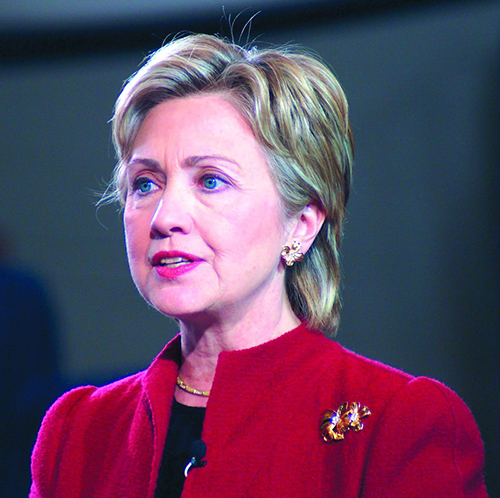
In an interview with The Atlantic last week, former Secretary of State and New York Senator Hillary Clinton, who may run for President of the United States in 2016, described U.S. President Barack Obama’s foreign policy’s main directive as “Don’t do stupid #$^t.” She told the magazine that fear of making mistakes is not “an organizing principle” worthy of the United States, a global leader, and that we need to be stronger in that regard.
Clinton did agree with Obama on Israel concerning Israel’s right to defend itself against Hamas rocket attacks.
“Just as we try to do in the U.S. and be as careful as possible in going after targets to avoid civilians, mistakes are made,” the official said in the interview, which was published last week. “We’ve made them. I don’t know a nation, no matter what its values are—and I think that democratic nations have demonstrably better values in a conflict position—that hasn’t made errors, but ultimately the responsibility rests with Hamas.”
Said Clinton, “It’s impossible to know what happens in the fog of war. Some reports say, maybe it wasn’t the exact UN school that was bombed, but it was the annex to the school next door where they were firing the rockets. And I do think oftentimes that the anguish you are privy to because of the coverage, and the women and the children and all the rest of that, makes it very difficult to sort through to get to the truth.”
Obama describes his policies as “interventionist and internationalist, but not isolationist or unilateral,” which means no military intervention on the ground in places like Iraq, Syria and Ukraine. Clinton criticized her boss’ decision not to take military action against Syrian President Bashar Assad after Assad crossed the red-line and poisoned his own people with chemical weapons.
“The failure to help build up a credible fighting force of the people who were the originators of the protests against Assad— there were Islamists, there were secularists, there was everything in the middle—the failure to do that left a big vacuum, which the jihadists have now filled,” Clinton said. She said we needed an “overarching” strategy to tackle Islamist extremists, and compared the challenge to the Cold War the U.S. fought with the USSR from the ‘50s to the ‘90s.
“One of the reasons why I worry about what’s happening in the Middle East right now is because of the breakout capacity of jihadist groups that can affect Europe, that can affect the U.S. Jihadist groups are governing territory. They will never stay there, though. They are driven to expand. Their raison d’etre is to be against the West, against the Crusaders, against the ‘fill-in-the-blanks.” And, she added, “We all fit into one of these categories. How do we try to contain that? I’m thinking a lot about containment, deterrence, and defeat,” she said.
This is not the first time Clinton disagreed with Obama. In her memoirs she said the president made a mistake when he warned Israel to freeze the settlements five years ago. “In retrospect, our early, hard line on settlements didn’t work,” Clinton wrote, and that ruling reinforced Abu Mazen’s position against Israel, leading to the collapse of the talks because East Jerusalem was not included in the terms.
Both sides were to blame for the collapse of the talks, but, she said, Abbas was wrong when he denigrated Israel’s “unprecedented” construction freeze. This was exacerbated by the Israeli right wing, which announced suspension of the freeze when U.S. VP Joe Biden made his visit to Israel a few years ago.
As Secretary of State, Clinton wanted Obama to provide arms to the rebels in Syria, most of them moderates at the time. She said, “The risks of both action and inaction were high, (but) the president’s inclination was to stay the present course and not take the significant further step of arming rebels. … No one likes to lose a debate, including me. But this was the President’s call and I respected his deliberations and decisions. From the beginning of our partnership, he had promised me that I would always get a fair hearing. And I always did. In this case, my position didn’t prevail,” she wrote.
The consequences of the West’s inaction, following the U.S. lead, is now playing itself out as ISIL (aka ISIS) is taking over the region, one town at a time, slaughtering infidels, including tens of thousands of Muslims who do not follow their extreme vision of Islam, thousands of Christians and Kurds. ISIL has now penetrated Lebanon and is working its way into Jordan and Saudi.
(from combined sources)










